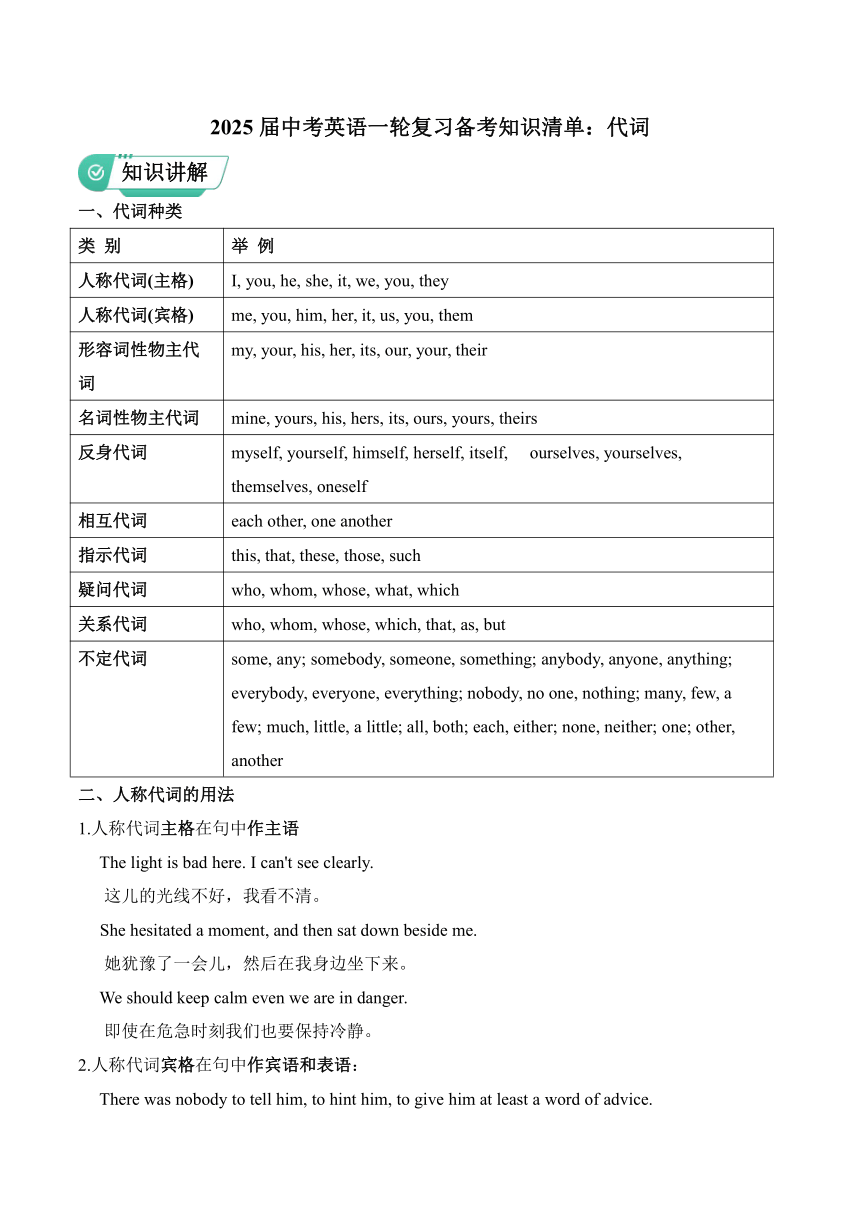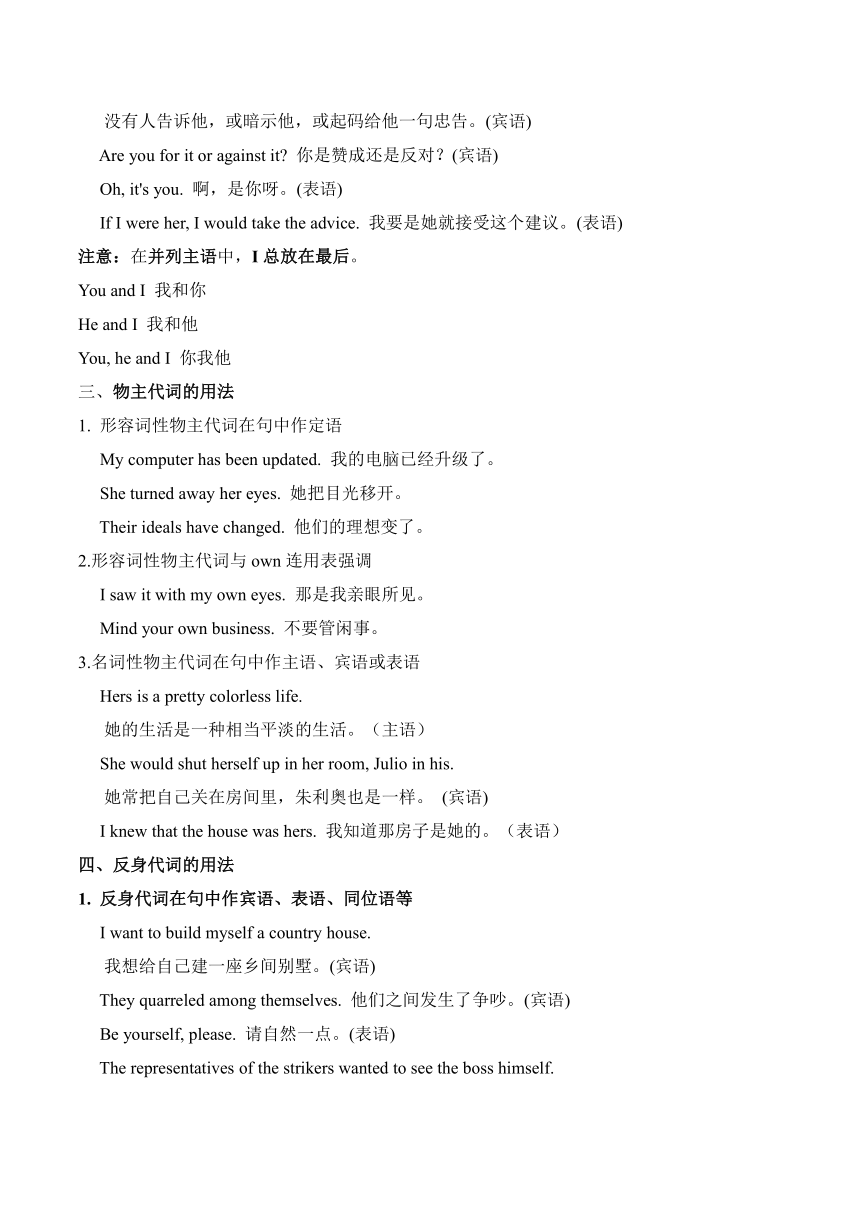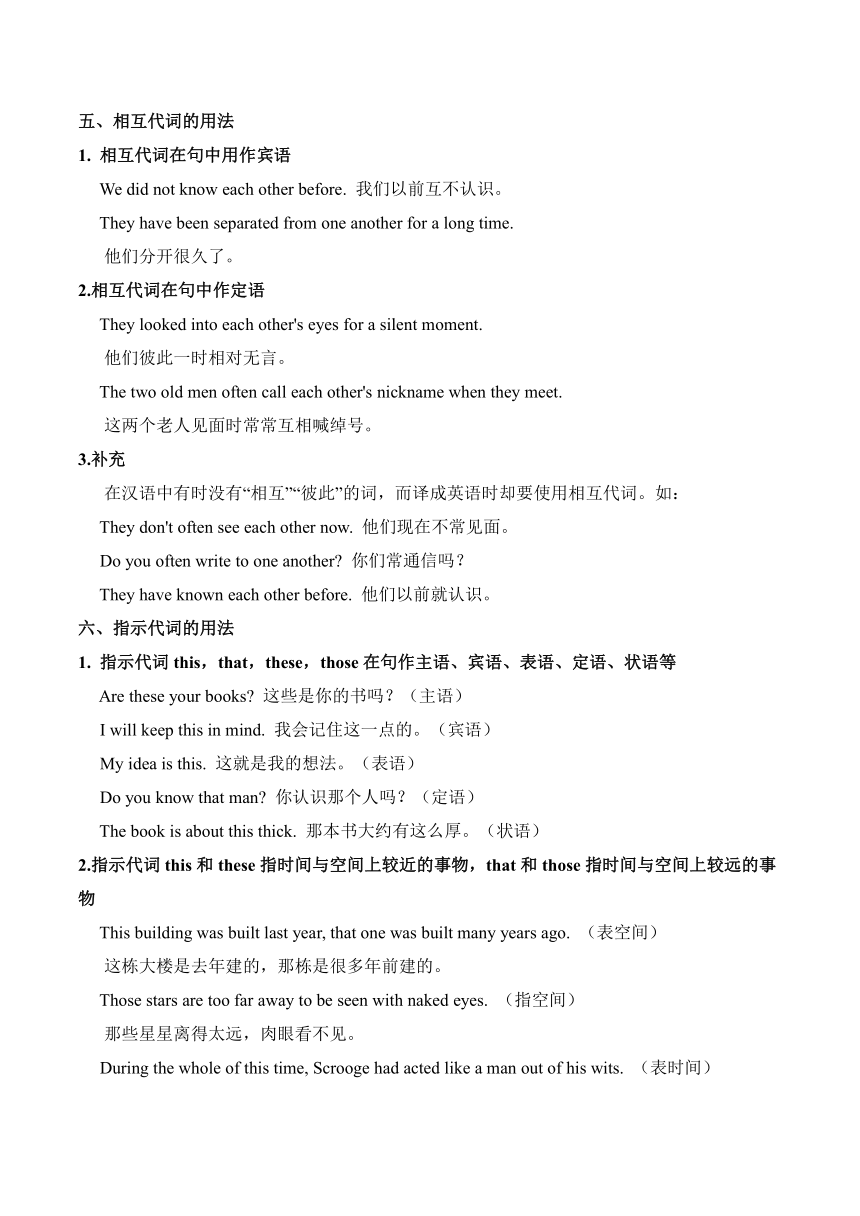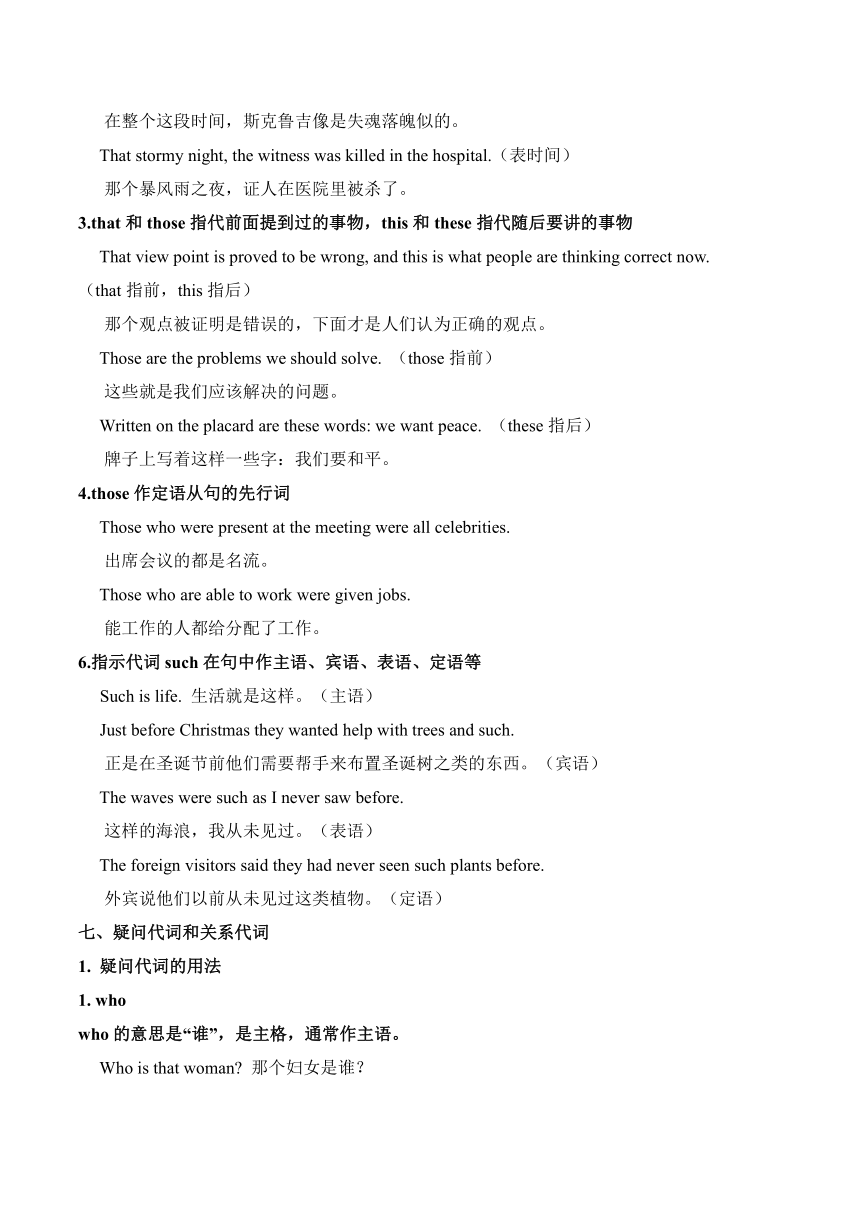2025届中考英语一轮复习备考知识清单:代词
文档属性
| 名称 | 2025届中考英语一轮复习备考知识清单:代词 |  | |
| 格式 | docx | ||
| 文件大小 | 39.8KB | ||
| 资源类型 | 教案 | ||
| 版本资源 | 通用版 | ||
| 科目 | 英语 | ||
| 更新时间 | 2024-12-12 10:41:25 | ||
图片预览





文档简介
2025届中考英语一轮复习备考知识清单:代词
知识讲解
一、代词种类
类 别 举 例
人称代词(主格) I, you, he, she, it, we, you, they
人称代词(宾格) me, you, him, her, it, us, you, them
形容词性物主代词 my, your, his, her, its, our, your, their
名词性物主代词 mine, yours, his, hers, its, ours, yours, theirs
反身代词 myself, yourself, himself, herself, itself, ourselves, yourselves, themselves, oneself
相互代词 each other, one another
指示代词 this, that, these, those, such
疑问代词 who, whom, whose, what, which
关系代词 who, whom, whose, which, that, as, but
不定代词 some, any; somebody, someone, something; anybody, anyone, anything; everybody, everyone, everything; nobody, no one, nothing; many, few, a few; much, little, a little; all, both; each, either; none, neither; one; other, another
二、人称代词的用法
1.人称代词主格在句中作主语
The light is bad here. I can't see clearly.
这儿的光线不好,我看不清。
She hesitated a moment, and then sat down beside me.
她犹豫了一会儿,然后在我身边坐下来。
We should keep calm even we are in danger.
即使在危急时刻我们也要保持冷静。
2.人称代词宾格在句中作宾语和表语:
There was nobody to tell him, to hint him, to give him at least a word of advice.
没有人告诉他,或暗示他,或起码给他一句忠告。(宾语)
Are you for it or against it 你是赞成还是反对?(宾语)
Oh, it's you. 啊,是你呀。(表语)
If I were her, I would take the advice. 我要是她就接受这个建议。(表语)
注意:在并列主语中,I总放在最后。
You and I 我和你
He and I 我和他
You, he and I 你我他
三、物主代词的用法
1. 形容词性物主代词在句中作定语
My computer has been updated. 我的电脑已经升级了。
She turned away her eyes. 她把目光移开。
Their ideals have changed. 他们的理想变了。
2.形容词性物主代词与own连用表强调
I saw it with my own eyes. 那是我亲眼所见。
Mind your own business. 不要管闲事。
3.名词性物主代词在句中作主语、宾语或表语
Hers is a pretty colorless life.
她的生活是一种相当平淡的生活。(主语)
She would shut herself up in her room, Julio in his.
她常把自己关在房间里,朱利奥也是一样。 (宾语)
I knew that the house was hers. 我知道那房子是她的。(表语)
四、反身代词的用法
1. 反身代词在句中作宾语、表语、同位语等
I want to build myself a country house.
我想给自己建一座乡间别墅。(宾语)
They quarreled among themselves. 他们之间发生了争吵。(宾语)
Be yourself, please. 请自然一点。(表语)
The representatives of the strikers wanted to see the boss himself.
罢工工人的代表想要见老板本人。(同位语)
2.反身代词与某些动词连用表示某种特定意义
Help yourself to some fruit. 请吃点水果。
He shaves himself once a day. 他一天刮一次脸。
Why did you absent yourself from school yesterday
你昨天为何没去上学?
3.反身代词用于某些固定习语中:
1) by oneself 独自干;单干。
He said he wanted to go out to have a walk by himself.
他说他想独自出去散步。
I managed to do it by myself. 我是自己做成这件事的。
This is a machine that works by itself.
这是一台自动化的机器。
2) for oneself 替自己;为自己;自己。
We'll have to judge for ourselves. 我们得自己来判断。
He demanded the right to decide for himself.
他要求得到自己做决定的权力。
3) of oneself 自动地。
The enemy will not perish of himself. 敌人不会自行绝灭的。
4) between ourselves 勿与外人道私下说的话。
All this is between ourselves. 这些都不能告诉别人。
Between ourselves, Mr. Black has gone abroad.
不要和外人讲,布莱克先生已出国了。
5) among themselves ……之间。
They had a heated discussion among themselves.
他们之间进行了热烈的讨论。
6) in oneself 本性;自身。
He is not bad in himself. 他本质不坏。
This is a good idea in itself. 这主意本身不错。
五、相互代词的用法
1. 相互代词在句中用作宾语
We did not know each other before. 我们以前互不认识。
They have been separated from one another for a long time.
他们分开很久了。
2.相互代词在句中作定语
They looked into each other's eyes for a silent moment.
他们彼此一时相对无言。
The two old men often call each other's nickname when they meet.
这两个老人见面时常常互相喊绰号。
3.补充
在汉语中有时没有“相互”“彼此”的词,而译成英语时却要使用相互代词。如:
They don't often see each other now. 他们现在不常见面。
Do you often write to one another 你们常通信吗?
They have known each other before. 他们以前就认识。
六、指示代词的用法
1. 指示代词this,that,these,those在句作主语、宾语、表语、定语、状语等
Are these your books 这些是你的书吗?(主语)
I will keep this in mind. 我会记住这一点的。(宾语)
My idea is this. 这就是我的想法。(表语)
Do you know that man 你认识那个人吗?(定语)
The book is about this thick. 那本书大约有这么厚。(状语)
2.指示代词this和these指时间与空间上较近的事物,that和those指时间与空间上较远的事物
This building was built last year, that one was built many years ago. (表空间)
这栋大楼是去年建的,那栋是很多年前建的。
Those stars are too far away to be seen with naked eyes. (指空间)
那些星星离得太远,肉眼看不见。
During the whole of this time, Scrooge had acted like a man out of his wits. (表时间)
在整个这段时间,斯克鲁吉像是失魂落魄似的。
That stormy night, the witness was killed in the hospital.(表时间)
那个暴风雨之夜,证人在医院里被杀了。
3.that和those指代前面提到过的事物,this和these指代随后要讲的事物
That view point is proved to be wrong, and this is what people are thinking correct now.
(that指前,this指后)
那个观点被证明是错误的,下面才是人们认为正确的观点。
Those are the problems we should solve. (those指前)
这些就是我们应该解决的问题。
Written on the placard are these words: we want peace. (these指后)
牌子上写着这样一些字:我们要和平。
4.those作定语从句的先行词
Those who were present at the meeting were all celebrities.
出席会议的都是名流。
Those who are able to work were given jobs.
能工作的人都给分配了工作。
6.指示代词such在句中作主语、宾语、表语、定语等
Such is life. 生活就是这样。(主语)
Just before Christmas they wanted help with trees and such.
正是在圣诞节前他们需要帮手来布置圣诞树之类的东西。(宾语)
The waves were such as I never saw before.
这样的海浪,我从未见过。(表语)
The foreign visitors said they had never seen such plants before.
外宾说他们以前从未见过这类植物。(定语)
七、疑问代词和关系代词
1. 疑问代词的用法
1. who
who的意思是“谁”,是主格,通常作主语。
Who is that woman 那个妇女是谁?
Who are those people 那些人是谁?
2.whom
whom 的意思是“谁”,是宾格,在句中作宾语,常用于书面语中。
whom do you want to see 你想见谁?
Whom do you talk about 你们在谈论谁?(whom作介词about的宾语)
3.whose
1) whose的意思是“谁的”,属格,具有名词和形容词的性质。如:
Whose book is this 这是谁的书?(形容词性)
Whose is this book 这书是谁的?(名词性)
2) whose可在句中作如下成分。
作主语。如:Whose is better 谁的更好?
作表语。如:Whose are these pencils 这些铅笔是谁的?
作宾语。如:Whose are you going to borrow 你打算借谁的?
作定语。如:Whose umbrella is this 这是谁的伞
4.what
1) what的意思是“什么”,具有名词和形容词的性质。
What are you doing 你在做什么?(名词性)
What sport do you like best 你最喜欢的运动是什么?(形容词性)
2) what可在句中作如下成分。
作主语。
what's happening 发生了什么事?
作表语。
What is your mother 你母亲是干什么工作的?
作宾语。
What do you mean 你是什么意思?
What did you talk to him about 你和他说了什么?(介词宾语)
作定语。
What color do you like 你喜欢什么颜色?
6.which
which的意思是“哪个”,which在句中可作主语、表语、宾语、定语等成分。
作主语。
This is my bag. Which is yours 这是我的书包,哪个是你的?
作表语。
Which is your favorite subject 你最喜欢哪个科目?
I can't tell which is which because they are so alike. 我分辨不出谁是谁,因为他们太像了。
作宾语。
Which do you like best 你最喜欢哪一个?
作定语。
Which glasses do you want 你想要哪些杯子?
Which platform does the London train leave 去伦敦的火车从哪个站台开出?
2. 关系代词who,whom,whose,that,which的用法
英语中的关系代词有who,whom,whose,that,which,它们是用来引导定语从句的。关系代词既代表定语从句所修饰的词,又在其所引导的从句中承担一个成分, 如主语、宾语、表语或定语。
This is the man who saved your son.
这就是救了你儿子的那个人。(who在从句中作主语,先行词是man)
The man whom I met yesterday is Jim.
我昨天见到的那个人是吉姆。(whom在从句中作宾语,它的先行词是man)
A child whose parents are dead is an orphan.
失去父母的孩子是孤儿。(whose在从句中作定语,它的先行词是child)
He wants a room whose window looks out over the sea.
他想要个窗户面临大海的房间。(whose在从句中作定语,它的先行词是room)
1) who,whom和whose
who和whom代表人,在从句中作主语时用who,作宾语时用whom,可省略。但若whom作介词宾语且介词放在其前时,不能省略;如介词位于句末时,可以省略。whose代表某人的,在从句中作定语。如:
The man who insists upon seeing with perfect clearness before he decides, never decides.
坚持看清楚一切后才做决定的人永远也做不了决定。(who作主语)
He is a man whom everybody respects.
他是一个人人都尊敬的人。(whom作宾语,可以省略)
He is a man from whom we all should learn.
他是我们大家都应该学习的人。 (whom作介词宾语且介词位于其前,不能省略)
(此句也可以是:He is a man (whom) we should all learn from.)
The people whose houses were damaged will be compensated.
房子被损坏了的人将给予补偿。
Who, whom和whose可用于非限制性定语从句中,代表某人或某人的,此时不能用that。
My sister, who is a nurse, came home for a few days.
我姐姐回家住了几天,她是个护士。
2) which
which代表物,在从句中可作主语或宾语,作宾语时可以省略,但作介词宾语且介词位于其前时不能省略。如:
The book which helps you most are those which make you think most.
最能使你获益的书是那些最能让你深思的书。(作主语)
This is a factor which we must not neglect.
这是一个我们绝不能忽略的因素。(作宾语,可省略)
Where is the book from which you quoted this sentence
你引用这句话的那本书在哪儿?(作介词宾语且介词位于其前时,不能省略)
which可用于非限制性定语从句中,代表物。如:
The book, which I bought second-hand, is made of oak.
我买的这张书桌是用橡木做的,它是二手货。
3) that
that可以代表事也可代表人,在从句中可以作主语或宾语,作宾语时可省略,但不能用于非限制性定语从句中。代表人时who比that用的多些,代表物时that比which用的多些。
The letter that came this morning is from my mother.
今天早晨收到的那封信是我母亲寄来的。(that代表物,在从句中作主语)
Those students that failed the exam will have to take it again.
考试不及格的学生必须补考。(that代表人,在从句中作主语)
Have you forgotten about the money (that) I lent you last week
你忘了上星期我借给你钱的事了吗?(that代表物,在从句中作宾语,可省略)
All the people (that) I invited have agreed to come.
所有我邀请了的人都同意来。(that代表人,在从句中作宾语,可省略)
The hotel (that) we stayed at was both cheap and comfortable.
我们住的那家旅馆既便宜又舒服。(that代表物,在从句中作介词宾语,可省略)
八、不定代词的用法
(一)some,any
1. some多用于肯定句,修饰复数可数名词和不可数名词,作“一些”解。它还可修饰单数可数名词,作“某一”解。如:
H-5 avian influenza first broke out in some Asian countries. H-5型禽流感首先在亚洲爆发。
Some people are early risers. 有些人起得很早。
2.any通常用于否定句、疑问句或条件句,修饰单数或复数可数名词以及不可数名词。
If there are any new magazines in the library, take some for me. 图书馆如果来了新杂志,替我借几本。
Are there any stamps in the drawer 抽屉里有邮票吗?
Is there any money with you 你身上带钱了吗?
3.any还可以用于肯定句,作“任何的”解。
You can come here any time. 你什么时候来都行。
You can get it at any shop. 你可以在任何一家商店买到它。
(二)either,both,all
1. either表示“两者中的任何一个”。
Either of the brothers is selfish. 两兄弟都非常自私。
Either will do. 两个都行。
2.both“两个都”,修饰可数名词,统指两者。
Tom and Jack both made some progress. 汤姆和杰克两个都有所进步。
Both of them should make concessions. 他们双方都应做出让步。
3.all“全部,所有的”,修饰可数名词和不可数名词,指两个以上的人或物。
All the students contributed to the fund. 所有的学生都为基金会捐了款。
All of the money has been spent. 钱都花完了。
We are all for you. 我们都支持你。
Say all you know and say it without reserve. 知无不言,言无不尽。
(三)no,neither,none
1. no“不”,可修饰单数和复数可数名词以及不可数名词。
Time and tide wait for no man. 时不我待。
There are no clouds in the sky. 天上没有云。
I have no money for such things. 我没钱买这些东西。
2.neither“两者中哪个都不”,其所指范围是两个人或物。
Neither answer is correct. 两个答案都不对。
Neither of the two countries is satisfied with the result of the talk. 两个国家都不满意会谈的结果。
3.none“没有一个人或东西”,它既可指可数名词(其所指范围是两个以上的人或物),又可指不可数名词。
All of the trees were cut down, and none was were left. 所有的树都被砍了,一棵也不剩。
None of the students failed the examination. 没有一个学生考试不及格。
None of this money is his. 这笔钱没有一点儿是他的。
(四)few, a few,little, a little
1. few的意思是“没有几个”; a few的意思是“少数”, “几个”; 修饰可数名词; a few表示肯定意义, few表示否定意义。
The problem is so difficult that few people can solve it. 这个问题太难了,几乎没人能做出来。
Only a few people can solve this problem. 只有几个人能解决这个问题。
Few of them want to go. 他们中几乎没有人想去。
A few of them want to go. 他们中有几个人想去。
2.little“没有多少”,a little“少量”,修饰不可数名词;a little表示肯定意义,little表示否定意义。如:
There is little rainfall this spring. 今年春季雨水很少。
Although it did not rain for the whole month, there is a little water in the pond.
虽然整整一个月没下雨了,但池塘里还有一点水。
(五)many, much, most
1. many用于修饰可数名词。
Many of the problems have been solved. 大部分问题已经解决了。
Many think that the situation will change soon. 很多人认为局势会很快改变。
2.much用于修饰不可数名词。
Much of the money has been spent. 这笔钱的大部分已经被花掉了。
They have finished much of the work. 他们已经完成了大部分的工作。
(六)another,other,the other,others,the others
1. another指同类中多个东西中的“另一个” (即one more)。
This watch doesn't work, I must get another one.
这块表坏了,我该另买一块了。
He went back to work too soon,and was laid up for another three months.
他回去上班过早,结果又病倒三个月。
但要注意: other与物主限定词连用也可指余下的另一个或全部。如:
Use your other hand. 用你的另一只手。
Mary is older than me but my other sisters are younger.
玛丽比我大,其余的都是我妹妹。
2.other单独使用时指其他的、另外的人或物。
There must be some other reason for him refusing to help.
他不予帮助一定另有原因。
I saw Tom with some other fellow students.
我看见汤姆和其他一些同学在一起。
3.the other one/ones.指同类中余下的另一个或另一些。
I'll have to use our duplicate key. I lost the other one.
我不得不用我们的备用钥匙了,我把那一把丢了。
Where are the other students 其他学生去哪儿了?
One of the murderers was caught, but the other is still at large.
一个凶手被抓住了,另一个却依然逍遥法外。
4.others是other的复数形式,指其他的、另外的人或物。
We should not think only of our children, there are others to be cared for also.
我们不应该只想到自己的孩子,还有别的孩子也需要照顾。
Others may object to this plan.
别人可能会反对这个计划。
6.the others表示同类中余下的全部。
The search party was divided into two groups. Some went to the right, the others went to the left.
搜寻小组一分为二,一部分人向右,另一部分向左。
Jenny is cleverer than any of. the others in her class.
珍妮比班上的其他(任何)人都聪明。
(七)复合不定代词someone somebody, something, anyone, anybody, anything, no one, nobody, nothing, everyone everybody, everything
1. someone, somebody某人和 something某物
Someone is asking to see you. 有人要见你。
Someone suggests putting off the meeting. 有人建议推迟会议。
There's something wrong with the machine. 机器出了毛病。
Something strange happened last night. 昨晚发生了件奇怪的事。
2.anyone, anybody任何人和 anything任何事情
Anybody can do this work. It's very simple. 这事太简单了,人人都能做。
Did you meet anyone on your way home 你回家的路上碰到什么人了吗?
He faltered:"Is anything wrong?" 他支支唔唔地说:“有什么错吗?”
He did not say anything after that. 这以后他再也没说什么。
3.no one, nobody没有人.和 nothing(没有东西)。
I'm not somebody. I'm nobody. 我不是重要人物,我是个无名小卒。
No one wants to do that. 没人愿做那种事。
Nobody is absent. 没有人缺席。
That's nothing. 那没有什么。
He said he knew nothing about it. 他说他对那事一无所知。
4.everyone, everybody(每个人)和 everything(每样东西,一切事物)。
She said good-bye to everyone. 她和每个人告别。
Everybody's business is nobody's business. 事关大家无人管。
Everything is ready for the experiment. 实验的一切都准备好了。
This news means everything to us. 这个消息对我们至关重要。
知识讲解
一、代词种类
类 别 举 例
人称代词(主格) I, you, he, she, it, we, you, they
人称代词(宾格) me, you, him, her, it, us, you, them
形容词性物主代词 my, your, his, her, its, our, your, their
名词性物主代词 mine, yours, his, hers, its, ours, yours, theirs
反身代词 myself, yourself, himself, herself, itself, ourselves, yourselves, themselves, oneself
相互代词 each other, one another
指示代词 this, that, these, those, such
疑问代词 who, whom, whose, what, which
关系代词 who, whom, whose, which, that, as, but
不定代词 some, any; somebody, someone, something; anybody, anyone, anything; everybody, everyone, everything; nobody, no one, nothing; many, few, a few; much, little, a little; all, both; each, either; none, neither; one; other, another
二、人称代词的用法
1.人称代词主格在句中作主语
The light is bad here. I can't see clearly.
这儿的光线不好,我看不清。
She hesitated a moment, and then sat down beside me.
她犹豫了一会儿,然后在我身边坐下来。
We should keep calm even we are in danger.
即使在危急时刻我们也要保持冷静。
2.人称代词宾格在句中作宾语和表语:
There was nobody to tell him, to hint him, to give him at least a word of advice.
没有人告诉他,或暗示他,或起码给他一句忠告。(宾语)
Are you for it or against it 你是赞成还是反对?(宾语)
Oh, it's you. 啊,是你呀。(表语)
If I were her, I would take the advice. 我要是她就接受这个建议。(表语)
注意:在并列主语中,I总放在最后。
You and I 我和你
He and I 我和他
You, he and I 你我他
三、物主代词的用法
1. 形容词性物主代词在句中作定语
My computer has been updated. 我的电脑已经升级了。
She turned away her eyes. 她把目光移开。
Their ideals have changed. 他们的理想变了。
2.形容词性物主代词与own连用表强调
I saw it with my own eyes. 那是我亲眼所见。
Mind your own business. 不要管闲事。
3.名词性物主代词在句中作主语、宾语或表语
Hers is a pretty colorless life.
她的生活是一种相当平淡的生活。(主语)
She would shut herself up in her room, Julio in his.
她常把自己关在房间里,朱利奥也是一样。 (宾语)
I knew that the house was hers. 我知道那房子是她的。(表语)
四、反身代词的用法
1. 反身代词在句中作宾语、表语、同位语等
I want to build myself a country house.
我想给自己建一座乡间别墅。(宾语)
They quarreled among themselves. 他们之间发生了争吵。(宾语)
Be yourself, please. 请自然一点。(表语)
The representatives of the strikers wanted to see the boss himself.
罢工工人的代表想要见老板本人。(同位语)
2.反身代词与某些动词连用表示某种特定意义
Help yourself to some fruit. 请吃点水果。
He shaves himself once a day. 他一天刮一次脸。
Why did you absent yourself from school yesterday
你昨天为何没去上学?
3.反身代词用于某些固定习语中:
1) by oneself 独自干;单干。
He said he wanted to go out to have a walk by himself.
他说他想独自出去散步。
I managed to do it by myself. 我是自己做成这件事的。
This is a machine that works by itself.
这是一台自动化的机器。
2) for oneself 替自己;为自己;自己。
We'll have to judge for ourselves. 我们得自己来判断。
He demanded the right to decide for himself.
他要求得到自己做决定的权力。
3) of oneself 自动地。
The enemy will not perish of himself. 敌人不会自行绝灭的。
4) between ourselves 勿与外人道私下说的话。
All this is between ourselves. 这些都不能告诉别人。
Between ourselves, Mr. Black has gone abroad.
不要和外人讲,布莱克先生已出国了。
5) among themselves ……之间。
They had a heated discussion among themselves.
他们之间进行了热烈的讨论。
6) in oneself 本性;自身。
He is not bad in himself. 他本质不坏。
This is a good idea in itself. 这主意本身不错。
五、相互代词的用法
1. 相互代词在句中用作宾语
We did not know each other before. 我们以前互不认识。
They have been separated from one another for a long time.
他们分开很久了。
2.相互代词在句中作定语
They looked into each other's eyes for a silent moment.
他们彼此一时相对无言。
The two old men often call each other's nickname when they meet.
这两个老人见面时常常互相喊绰号。
3.补充
在汉语中有时没有“相互”“彼此”的词,而译成英语时却要使用相互代词。如:
They don't often see each other now. 他们现在不常见面。
Do you often write to one another 你们常通信吗?
They have known each other before. 他们以前就认识。
六、指示代词的用法
1. 指示代词this,that,these,those在句作主语、宾语、表语、定语、状语等
Are these your books 这些是你的书吗?(主语)
I will keep this in mind. 我会记住这一点的。(宾语)
My idea is this. 这就是我的想法。(表语)
Do you know that man 你认识那个人吗?(定语)
The book is about this thick. 那本书大约有这么厚。(状语)
2.指示代词this和these指时间与空间上较近的事物,that和those指时间与空间上较远的事物
This building was built last year, that one was built many years ago. (表空间)
这栋大楼是去年建的,那栋是很多年前建的。
Those stars are too far away to be seen with naked eyes. (指空间)
那些星星离得太远,肉眼看不见。
During the whole of this time, Scrooge had acted like a man out of his wits. (表时间)
在整个这段时间,斯克鲁吉像是失魂落魄似的。
That stormy night, the witness was killed in the hospital.(表时间)
那个暴风雨之夜,证人在医院里被杀了。
3.that和those指代前面提到过的事物,this和these指代随后要讲的事物
That view point is proved to be wrong, and this is what people are thinking correct now.
(that指前,this指后)
那个观点被证明是错误的,下面才是人们认为正确的观点。
Those are the problems we should solve. (those指前)
这些就是我们应该解决的问题。
Written on the placard are these words: we want peace. (these指后)
牌子上写着这样一些字:我们要和平。
4.those作定语从句的先行词
Those who were present at the meeting were all celebrities.
出席会议的都是名流。
Those who are able to work were given jobs.
能工作的人都给分配了工作。
6.指示代词such在句中作主语、宾语、表语、定语等
Such is life. 生活就是这样。(主语)
Just before Christmas they wanted help with trees and such.
正是在圣诞节前他们需要帮手来布置圣诞树之类的东西。(宾语)
The waves were such as I never saw before.
这样的海浪,我从未见过。(表语)
The foreign visitors said they had never seen such plants before.
外宾说他们以前从未见过这类植物。(定语)
七、疑问代词和关系代词
1. 疑问代词的用法
1. who
who的意思是“谁”,是主格,通常作主语。
Who is that woman 那个妇女是谁?
Who are those people 那些人是谁?
2.whom
whom 的意思是“谁”,是宾格,在句中作宾语,常用于书面语中。
whom do you want to see 你想见谁?
Whom do you talk about 你们在谈论谁?(whom作介词about的宾语)
3.whose
1) whose的意思是“谁的”,属格,具有名词和形容词的性质。如:
Whose book is this 这是谁的书?(形容词性)
Whose is this book 这书是谁的?(名词性)
2) whose可在句中作如下成分。
作主语。如:Whose is better 谁的更好?
作表语。如:Whose are these pencils 这些铅笔是谁的?
作宾语。如:Whose are you going to borrow 你打算借谁的?
作定语。如:Whose umbrella is this 这是谁的伞
4.what
1) what的意思是“什么”,具有名词和形容词的性质。
What are you doing 你在做什么?(名词性)
What sport do you like best 你最喜欢的运动是什么?(形容词性)
2) what可在句中作如下成分。
作主语。
what's happening 发生了什么事?
作表语。
What is your mother 你母亲是干什么工作的?
作宾语。
What do you mean 你是什么意思?
What did you talk to him about 你和他说了什么?(介词宾语)
作定语。
What color do you like 你喜欢什么颜色?
6.which
which的意思是“哪个”,which在句中可作主语、表语、宾语、定语等成分。
作主语。
This is my bag. Which is yours 这是我的书包,哪个是你的?
作表语。
Which is your favorite subject 你最喜欢哪个科目?
I can't tell which is which because they are so alike. 我分辨不出谁是谁,因为他们太像了。
作宾语。
Which do you like best 你最喜欢哪一个?
作定语。
Which glasses do you want 你想要哪些杯子?
Which platform does the London train leave 去伦敦的火车从哪个站台开出?
2. 关系代词who,whom,whose,that,which的用法
英语中的关系代词有who,whom,whose,that,which,它们是用来引导定语从句的。关系代词既代表定语从句所修饰的词,又在其所引导的从句中承担一个成分, 如主语、宾语、表语或定语。
This is the man who saved your son.
这就是救了你儿子的那个人。(who在从句中作主语,先行词是man)
The man whom I met yesterday is Jim.
我昨天见到的那个人是吉姆。(whom在从句中作宾语,它的先行词是man)
A child whose parents are dead is an orphan.
失去父母的孩子是孤儿。(whose在从句中作定语,它的先行词是child)
He wants a room whose window looks out over the sea.
他想要个窗户面临大海的房间。(whose在从句中作定语,它的先行词是room)
1) who,whom和whose
who和whom代表人,在从句中作主语时用who,作宾语时用whom,可省略。但若whom作介词宾语且介词放在其前时,不能省略;如介词位于句末时,可以省略。whose代表某人的,在从句中作定语。如:
The man who insists upon seeing with perfect clearness before he decides, never decides.
坚持看清楚一切后才做决定的人永远也做不了决定。(who作主语)
He is a man whom everybody respects.
他是一个人人都尊敬的人。(whom作宾语,可以省略)
He is a man from whom we all should learn.
他是我们大家都应该学习的人。 (whom作介词宾语且介词位于其前,不能省略)
(此句也可以是:He is a man (whom) we should all learn from.)
The people whose houses were damaged will be compensated.
房子被损坏了的人将给予补偿。
Who, whom和whose可用于非限制性定语从句中,代表某人或某人的,此时不能用that。
My sister, who is a nurse, came home for a few days.
我姐姐回家住了几天,她是个护士。
2) which
which代表物,在从句中可作主语或宾语,作宾语时可以省略,但作介词宾语且介词位于其前时不能省略。如:
The book which helps you most are those which make you think most.
最能使你获益的书是那些最能让你深思的书。(作主语)
This is a factor which we must not neglect.
这是一个我们绝不能忽略的因素。(作宾语,可省略)
Where is the book from which you quoted this sentence
你引用这句话的那本书在哪儿?(作介词宾语且介词位于其前时,不能省略)
which可用于非限制性定语从句中,代表物。如:
The book, which I bought second-hand, is made of oak.
我买的这张书桌是用橡木做的,它是二手货。
3) that
that可以代表事也可代表人,在从句中可以作主语或宾语,作宾语时可省略,但不能用于非限制性定语从句中。代表人时who比that用的多些,代表物时that比which用的多些。
The letter that came this morning is from my mother.
今天早晨收到的那封信是我母亲寄来的。(that代表物,在从句中作主语)
Those students that failed the exam will have to take it again.
考试不及格的学生必须补考。(that代表人,在从句中作主语)
Have you forgotten about the money (that) I lent you last week
你忘了上星期我借给你钱的事了吗?(that代表物,在从句中作宾语,可省略)
All the people (that) I invited have agreed to come.
所有我邀请了的人都同意来。(that代表人,在从句中作宾语,可省略)
The hotel (that) we stayed at was both cheap and comfortable.
我们住的那家旅馆既便宜又舒服。(that代表物,在从句中作介词宾语,可省略)
八、不定代词的用法
(一)some,any
1. some多用于肯定句,修饰复数可数名词和不可数名词,作“一些”解。它还可修饰单数可数名词,作“某一”解。如:
H-5 avian influenza first broke out in some Asian countries. H-5型禽流感首先在亚洲爆发。
Some people are early risers. 有些人起得很早。
2.any通常用于否定句、疑问句或条件句,修饰单数或复数可数名词以及不可数名词。
If there are any new magazines in the library, take some for me. 图书馆如果来了新杂志,替我借几本。
Are there any stamps in the drawer 抽屉里有邮票吗?
Is there any money with you 你身上带钱了吗?
3.any还可以用于肯定句,作“任何的”解。
You can come here any time. 你什么时候来都行。
You can get it at any shop. 你可以在任何一家商店买到它。
(二)either,both,all
1. either表示“两者中的任何一个”。
Either of the brothers is selfish. 两兄弟都非常自私。
Either will do. 两个都行。
2.both“两个都”,修饰可数名词,统指两者。
Tom and Jack both made some progress. 汤姆和杰克两个都有所进步。
Both of them should make concessions. 他们双方都应做出让步。
3.all“全部,所有的”,修饰可数名词和不可数名词,指两个以上的人或物。
All the students contributed to the fund. 所有的学生都为基金会捐了款。
All of the money has been spent. 钱都花完了。
We are all for you. 我们都支持你。
Say all you know and say it without reserve. 知无不言,言无不尽。
(三)no,neither,none
1. no“不”,可修饰单数和复数可数名词以及不可数名词。
Time and tide wait for no man. 时不我待。
There are no clouds in the sky. 天上没有云。
I have no money for such things. 我没钱买这些东西。
2.neither“两者中哪个都不”,其所指范围是两个人或物。
Neither answer is correct. 两个答案都不对。
Neither of the two countries is satisfied with the result of the talk. 两个国家都不满意会谈的结果。
3.none“没有一个人或东西”,它既可指可数名词(其所指范围是两个以上的人或物),又可指不可数名词。
All of the trees were cut down, and none was were left. 所有的树都被砍了,一棵也不剩。
None of the students failed the examination. 没有一个学生考试不及格。
None of this money is his. 这笔钱没有一点儿是他的。
(四)few, a few,little, a little
1. few的意思是“没有几个”; a few的意思是“少数”, “几个”; 修饰可数名词; a few表示肯定意义, few表示否定意义。
The problem is so difficult that few people can solve it. 这个问题太难了,几乎没人能做出来。
Only a few people can solve this problem. 只有几个人能解决这个问题。
Few of them want to go. 他们中几乎没有人想去。
A few of them want to go. 他们中有几个人想去。
2.little“没有多少”,a little“少量”,修饰不可数名词;a little表示肯定意义,little表示否定意义。如:
There is little rainfall this spring. 今年春季雨水很少。
Although it did not rain for the whole month, there is a little water in the pond.
虽然整整一个月没下雨了,但池塘里还有一点水。
(五)many, much, most
1. many用于修饰可数名词。
Many of the problems have been solved. 大部分问题已经解决了。
Many think that the situation will change soon. 很多人认为局势会很快改变。
2.much用于修饰不可数名词。
Much of the money has been spent. 这笔钱的大部分已经被花掉了。
They have finished much of the work. 他们已经完成了大部分的工作。
(六)another,other,the other,others,the others
1. another指同类中多个东西中的“另一个” (即one more)。
This watch doesn't work, I must get another one.
这块表坏了,我该另买一块了。
He went back to work too soon,and was laid up for another three months.
他回去上班过早,结果又病倒三个月。
但要注意: other与物主限定词连用也可指余下的另一个或全部。如:
Use your other hand. 用你的另一只手。
Mary is older than me but my other sisters are younger.
玛丽比我大,其余的都是我妹妹。
2.other单独使用时指其他的、另外的人或物。
There must be some other reason for him refusing to help.
他不予帮助一定另有原因。
I saw Tom with some other fellow students.
我看见汤姆和其他一些同学在一起。
3.the other one/ones.指同类中余下的另一个或另一些。
I'll have to use our duplicate key. I lost the other one.
我不得不用我们的备用钥匙了,我把那一把丢了。
Where are the other students 其他学生去哪儿了?
One of the murderers was caught, but the other is still at large.
一个凶手被抓住了,另一个却依然逍遥法外。
4.others是other的复数形式,指其他的、另外的人或物。
We should not think only of our children, there are others to be cared for also.
我们不应该只想到自己的孩子,还有别的孩子也需要照顾。
Others may object to this plan.
别人可能会反对这个计划。
6.the others表示同类中余下的全部。
The search party was divided into two groups. Some went to the right, the others went to the left.
搜寻小组一分为二,一部分人向右,另一部分向左。
Jenny is cleverer than any of. the others in her class.
珍妮比班上的其他(任何)人都聪明。
(七)复合不定代词someone somebody, something, anyone, anybody, anything, no one, nobody, nothing, everyone everybody, everything
1. someone, somebody某人和 something某物
Someone is asking to see you. 有人要见你。
Someone suggests putting off the meeting. 有人建议推迟会议。
There's something wrong with the machine. 机器出了毛病。
Something strange happened last night. 昨晚发生了件奇怪的事。
2.anyone, anybody任何人和 anything任何事情
Anybody can do this work. It's very simple. 这事太简单了,人人都能做。
Did you meet anyone on your way home 你回家的路上碰到什么人了吗?
He faltered:"Is anything wrong?" 他支支唔唔地说:“有什么错吗?”
He did not say anything after that. 这以后他再也没说什么。
3.no one, nobody没有人.和 nothing(没有东西)。
I'm not somebody. I'm nobody. 我不是重要人物,我是个无名小卒。
No one wants to do that. 没人愿做那种事。
Nobody is absent. 没有人缺席。
That's nothing. 那没有什么。
He said he knew nothing about it. 他说他对那事一无所知。
4.everyone, everybody(每个人)和 everything(每样东西,一切事物)。
She said good-bye to everyone. 她和每个人告别。
Everybody's business is nobody's business. 事关大家无人管。
Everything is ready for the experiment. 实验的一切都准备好了。
This news means everything to us. 这个消息对我们至关重要。
